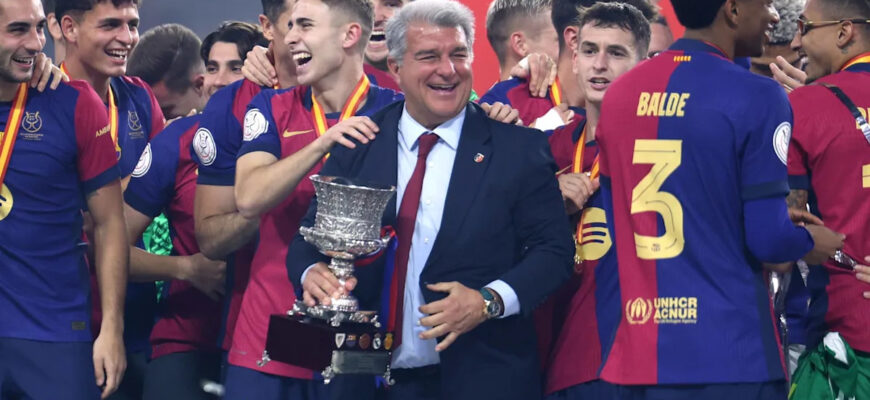Following FC Barcelona`s triumphant Liga campaign, club President Joan Laporta has embarked on a series of revealing interviews, offering insights into the inner workings and future strategies of the Catalan giant. Speaking with TV3, Laporta navigated a range of pressing topics, from the delicate art of player renewals to the unexpected success of a new managerial appointment, all while finding familiar ground for a subtle — or not-so-subtle — critique of a certain Madrid-based rival. It seems winning trophies doesn`t diminish the presidential appetite for robust discourse.
Lamine Yamal: The Art of Suffering for a Star`s Signature
At the heart of Laporta`s discussion was the highly anticipated contract extension for the prodigious 17-year-old talent, Lamine Yamal. The president`s outlook on the negotiation process was refreshingly candid, albeit with a dramatic flair:
“There`s always suffering involved,” Laporta remarked, a statement that, for a club of Barcelona`s stature securing a generational talent, one might wonder if such `suffering` is, perhaps, a delightful challenge. He quickly added, “It`s being worked on, and it seems it will go well because Lamine is a great player and an extraordinary, mature person.”
The conversation quickly turned to the financial aspect, with Laporta confirming that Yamal`s remuneration would be tailored to his burgeoning importance, regardless of his youth. “It must correspond to the importance he has, beyond his age. He must receive special treatment,” he asserted, noting that Yamal “falls outside the norm.” The club aims to align the player`s interests with its own, a task made simpler by Yamal`s deep roots in Catalonia and his allegiance to Barça. The president expressed optimism, citing “good sensations” from the player`s entourage and family, who are “well-advised.”
Drawing parallels to the club`s most iconic figure, Lionel Messi, Laporta hinted at a similar contractual structure for Yamal. “In the first contract we did with Messi, it consolidated the bonuses. And because he won everything, that consolidated into his salary,” he explained. This suggests a performance-based incentive system designed to reward success, a prudent approach for any club, especially one navigating financial constraints.
Intriguingly, the discussion also touched upon the legendary No. 10 jersey, historically worn by Messi. Laporta indicated that the decision rests with Sporting Director Deco, stating, “That will be decided by Deco; the matter is internal.” He praised Yamal`s modern playing style, highlighting his individual talent and willingness to contribute defensively, traits that certainly echo the versatility required of a player donning such an emblematic number.
Hansi Flick: A `Johan-esque` Vision and a Nod to the Sporting Team
The conversation seamlessly transitioned to the successful integration of coach Hansi Flick, whose impact has clearly pleased the president. Laporta revealed his initial briefing to Flick, emphasizing Barcelona`s unique philosophy:
“It`s true that when we signed him, I explained and gave him a letter about what Barça is, that we not only like to win but also care about how we do it. He understood it perfectly.”
This commitment to a distinct style of play, often dubbed “Barça DNA,” remains a cornerstone of the club`s identity. When pressed on who truly deserved credit for Flick`s arrival, Laporta, ever the politician, humbly clarified his role. “The medal goes to Deco and Bojan,” he declared, praising their decisive input. “I only orient. The merit is Deco`s and his team`s.” One might detect a subtle blend of presidential oversight and strategic delegation in this statement.
Laporta further elaborated on Flick`s appeal, drawing a rather poetic comparison to the club`s revered figure, Johan Cruyff. “Flick has Johan`s look, those crystalline blue eyes… and he sees football like him,” Laporta mused, combining aesthetic observation with tactical endorsement. Beyond the visual, Flick`s rigorous approach and strong player management skills were highlighted as crucial attributes, particularly after the departure of Xavi Hernández. While acknowledging Xavi`s Liga and Supercopa victories, Laporta stated, “we needed a change, and he met all the requirements.”
Regarding Flick`s future, Laporta confirmed that the German coach`s contract renewal is “agreed but not signed” — a detail that, in the world of football, often signifies that the ink is merely a formality away.
Refereeing and Rivalry: A Familiar Attack on Real Madrid
No Laporta interview would be complete without a foray into the often-contentious realm of refereeing, and the president did not disappoint. Venturing into familiar, if swampy, territory, Laporta reignited the debate surrounding what he terms “sociological Madridismo” and launched several pointed criticisms at Real Madrid.
“There is a sociological Madridismo, and I haven`t said it gratuitously,” Laporta asserted, referencing the perceived systemic bias favoring the capital club. He went on to criticize what he views as a “victim” strategy employed by rivals, suggesting it can yield advantages.
Laporta expressed concerns about VAR`s “distortions” but stated Barcelona`s preference for facilitating the referees` work rather than “conditioning” them – a thinly veiled jab at Real Madrid`s public criticisms of officials. He also dismissed the ongoing “Negreira case” as an attempt at institutional discreditation that “will end up amounting to nothing,” reaffirming Barcelona`s strategy to “complain little” and focus on improving the game. It seems that while Barcelona may choose to complain less, its president remains quite adept at issuing a firm retort when the opportunity arises.
In conclusion, Joan Laporta`s latest interview painted a picture of a club that, fresh off a title win, is confidently navigating its future. From securing its most promising talent to praising its new coach and maintaining a defiant stance against its rivals, Barcelona under Laporta continues to be a club defined by its ambition, its distinct philosophy, and its president`s unwavering—and often entertaining—frankness.








